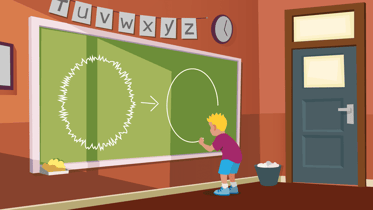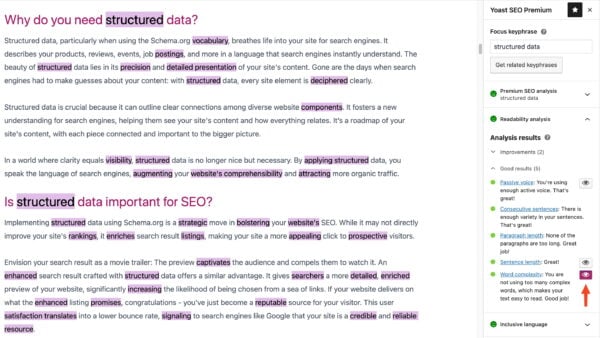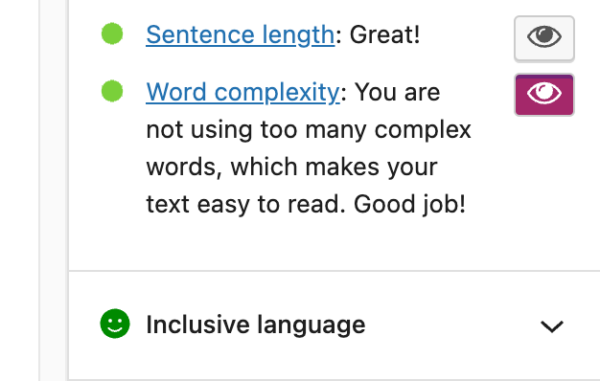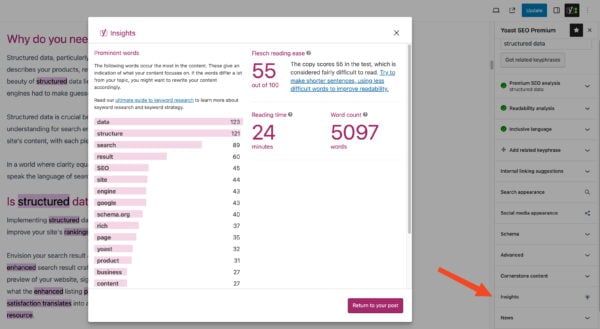The word complexity assessment in Yoast SEO Premium

The word complexity assessment in Yoast SEO Premium and Yoast SEO for Shopify checks whether a text has too many complex words. But what is a complex word in the first place? How many complex words are too many in a text? What is the scientific reasoning behind this assessment? You’ll find all the answers to these questions and more in the article below.
The word complexity assessment
As you can imagine from the naming, the word complexity assessment checks your text and highlights complex words according to our definition. It also tells you the percentage of words in your text that are complex.
The more uncommon and complicated words you use, the harder it might be for your visitors to fully grasp your message. Thanks to the feedback in Yoast SEO, you can quickly identify these complex words and change them accordingly.
The word complexity assessment is available in English, Spanish, German, and French. Don’t worry if your native language is not listed here; we’ll be rolling out support for more languages in the upcoming updates of Yoast SEO Premium.

How the assessment works
So, how do we define whether a word is complex or not? As a starting point, we used datasets from several research pieces that include native and non-native participants. We then ran our test and created a model that can discern between complex and non-complex words based on their word length and frequency.
As the final product, for the English language, we regard a word as complex if:
- It’s longer than seven characters AND
- It does not appear in the top 5000 most frequent words AND
- It does not start with a capital letter.
For instance, the word ‘trajectory’ can be seen as complex because it meets the conditions above. We exclude words that start with a capital letter as they begin a sentence or refer to specific individuals, locations, nationalities, titles, or events. Therefore, it would be impossible to replace these words.
We then use the following feedback strings to assess your text as a whole:
- Good (green traffic light): you are using fewer complex words, which makes your text easy to read.
- Okay (orange traffic light): a percentage of the words in your text is considered complex. Try to use shorter and more familiar words to improve readability.
- Bad (red traffic light): same as the orange traffic light, but triggered for cornerstone content.
We assign a threshold of 10% for the green score for the word complexity feedback. If less than 10% of the words in your text are complex, then your overall text can be considered easy to understand. On the other hand, if more than 10% of your text’s words are complex, we recommend you use shorter and more common words.
Using the assessment to your advantage
It’s pretty straightforward. The assessment works in the background, checking your text as you write. You’ll notice an eye icon next to the feedback in your sidebar. Clicking the icon will highlight words that are complex and uncommon. You can then decide what you want to do with these words.

Remember, Yoast SEO’s feedback may include words that are not complex for you or your audience. If that’s the case, then, by all means, skip those suggestions. Next to that, there are many instances where it takes more work to replace complex words with more accessible counterparts.
Let’s say you’re writing a business report or a research summary that contains many specialized and niche-specific words. Most likely, the audience you’re writing for will understand those words, so you can safely skip our suggestions.
Remember, no one knows your audience better than you! Regardless, we advise you to make your text as easy to understand as possible.
Why do we have this feature?
The internet has enabled us to live in an interconnected and fast-paced world. Nowadays, people constantly use the internet to search for all kinds of things. They also jump between websites to find the best possible answers. They may come to your site from Google, quickly scan your content, and bounce back because your content isn’t easy to understand at first glance. Next to that, if you have a website, especially one with content in English, it’s very likely to attract visitors from various places worldwide.
For those reasons, we believe you should try to make your content accessible and easily understood. Of course, all without affecting the message you want to send. By making your content easier to read, you’re opening it up to a broader range of audiences. At the same time, easy-to-read content keeps your visitors engaged, making them stay longer on your site.
And if you want your text to be easier to read, reducing sentence length and the number of complex words you use is the first thing to do. With feedback from the word complexity assessment, you can quickly identify words in your text that are used more rarely. Then, all left for you to do is choose a more commonly used alternative for those words.
What about the Flesch reading ease score?
Previously, we had the Flesch reading ease score to give you a sense of how difficult a text would be to understand for users of different levels. It works well, and we’ve optimized many posts using this feedback. But we also find ourselves thinking: it could be more actionable?
Let’s say you have a post with an FRE score of 45 – considered difficult to read, and you want to make it easier to understand. How can you do that? Where should you start? With these thoughts in mind, we devised ideas to make our analysis more actionable. The final product was the word complexity assessment – a feature that is much more actionable because it offers you a direct measure of readability.
But even though the word complexity assessment has replaced the Flesch reading ease, it will be around for a while. We’ve just moved the feature into the Insight tab instead. Here, you’ll find the score and other insights into your content, such as the word count, reading time, and the prominent words in your text. But moving forward, we won’t use this assessment in the readability analysis.

Available in Yoast SEO Premium
The word complexity assessment is available from Yoast SEO Premium. Be sure to try this feature! Stay tuned for more language support in our upcoming updates.
For our users running the free version of Yoast SEO, this assessment will appear in the readability analysis, but the option will be greyed out. You should consider upgrading to Yoast SEO Premium to unlock this feature. It’s powerful and actionable, and it will help you write excellent content your users will appreciate.

